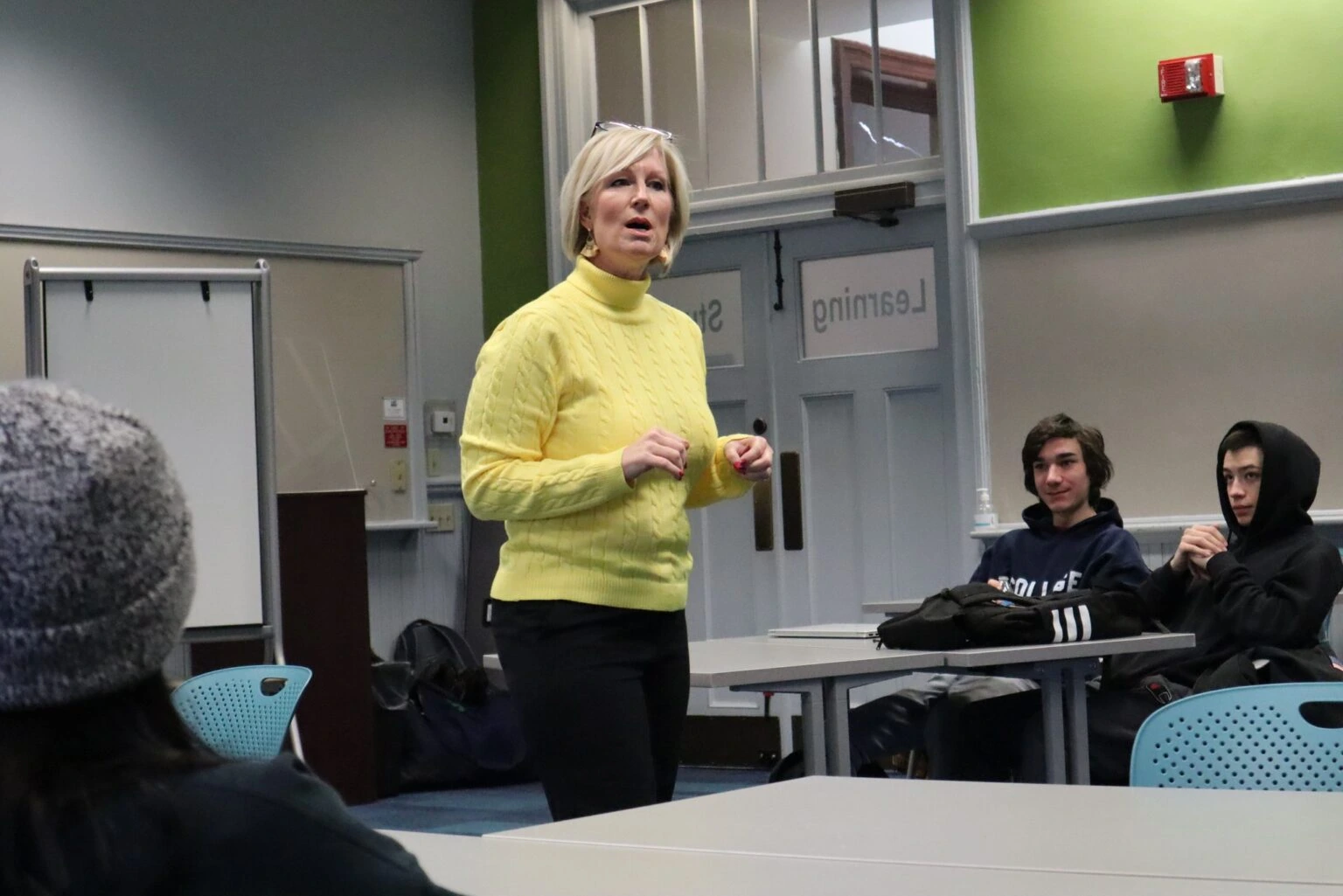Understanding National and Local Media

Kim Supon Kelly, a former reporter and anchor on Newswatch 16, joined a media ethics class at Lackawanna College to provide insight into the world of journalism and current broadcast media.
Kelly began her early career in broadcast, being a radio host for WKRZ 98.5 and continued working in different media outlets until becoming a reporter at Newswatch 16. After a few years as a journalist, Kelly moved up to becoming the morning anchor for WNEP-TV for thirteen years, winning the award for best local anchor eight years in a row. During her presentation, Kelly spoke on her early career in radio and journalism, providing students insight on the importance of their time at college.
“When you’re here make yourself present, Kelly said. “Don’t just be another body, make yourself stand out and be memorable.”
Kelly continued, recounting her role as a reporter when she first started at Newswatch 16 and how her news director made her focus getting the information for a story and being objective as possible when delivering the story.
“I was told to try to present the other side of the story and show both sides of what is happening,” Kelly said. “To me, a journalist’s job is to tell the story.”
This discussion lead to how the viewer perceives the modern multinational news stations and how different media outlets present different headlines. For example, one multinational news station may present a headline at the top of the news hour that is different from another’s. According to the University of Nebraska Omaha, newsworthiness is determined by multiple factors such as impact of the story, proximity to the viewer, timeliness, prominent figures in our society, human interest and novelty of a story.
Another factor affecting newsworthiness is media bias. Media bias occurs when journalists or news organizations allow their own opinions to affect the news they report and the way they report it. To seek the full scope of the story, Kelly recommended tuning into multiple stations and news outlets online.
“Is there media bias in the mainstream outlets? Yes, but now it’s more obvious,” Kelly said. “I think you should be opened minded enough to seek numerous sources of differing political agendas and then you can inform your own opinion.”
The presentation was held in assistant professor John Baldino’s class and Baldino emphasized the importance of media ethics not only from a journalist’s perspective but a viewer’s reception from seeing the story. Baldino and Kelly spoke on becoming an ethical and active listener when viewing the news.
“The ethical burden has shifted from the journalistic institutions to the consumer, we are fed so much information that is skewed that we now have this ethical responsibility to fact check and research to fully understand the news,” Baldino said. “The evolution or devolution of particularly national news has created this burden to the consumer, it’s now essential to understand the ethical implications of journalism.”
The discussion continued on how news has changed over the years from a local and national level. Baldino spoke from his industry experience and his time as an educator, emphasizing the importance of understanding and contemplating.
“Critical thinking is essential and not everyone is educated in critical thinking, which is why philosophy is required for most majors at Lackawanna College, in this course we learn a little bit more about being an ethical news consumer,” Baldino said. “We need to educate people on what to take from a news story, what not to insert into a news story and the difference between fact and opinion.”
With the focus shifting to local news, the discussion finished with the importance of staying active in the community one lives in. To Kelly this meant not only being an influencer in a local community but staying aware of the community around one’s self.
“There’s value in knowing and understand your corner of the world, especially if you’re living in it, you should understand its strengths and its weaknesses,” Kelly said. “If you’re going to be invested in any way shape or form as a future business owner or as a teacher, it’s important to understand the make-up of your community.”
Baldino presented a philosophical stand point of the importance of local news and how individuals need to stay up to date with local happenings.
“As members of a society, we all have an ethical obligation to be positive contributor to that society, well how do you contribute to a society you don’t understand? That’s where local news comes in,” Baldino said. “It doesn’t give us a full understanding of society but consuming local news gives us a good idea to what’s happening in this society and maybe sparks an idea of how we can be better contributors.”
